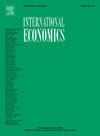中国在美国市场的贸易转移对第三国工资的影响:来自泰国的证据
引用次数: 0
摘要
自2010年代后半期以来,受中美贸易战和中国防控新冠肺炎等因素影响,中国对美国出口逐渐减少。这种减少导致包括泰国在内的第三国通过替代中国的出口而增加对美国市场的出口,即贸易转移。在此背景下,本研究实证考察了中国对美出口变化所导致的对美出口变化对泰国工资的影响。特别地,我们根据工人的特点检验了异质性效应。为此,我们使用2017年第一季度至2023年第二季度的个人层面季度数据进行回归分析。我们的主要发现是,低技能和中等技能职业之间的工资差距缩小了,而中技能和高技能职业之间的工资差距扩大了。也就是说,对美出口的增加造成了泰国的“工资两极分化”。我们还发现,对美出口的增加扩大了年龄上的工资差距,但缩小了性别上的工资差距。本文章由计算机程序翻译,如有差异,请以英文原文为准。
Impacts of trade diversion from China in the United States market on wages in a third country: Evidence from Thailand
Since the latter half of the 2010s, China's exports to the United States (US) have gradually decreased due to the US-China trade war and other factors, such as lockdown measures in China to combat COVID-19. This decrease has resulted in increasing exports from third countries, including Thailand, to the US market by substituting China's exports, i.e., trade diversion. Against this backdrop, this study empirically investigates how the changes in exports to the US driven by the change in China's exports to the US affect wages in Thailand. Especially, we examine the heterogeneous effects according to workers' characteristics. To this end, we conduct regression analyses using individual-level quarterly data from the first quarter of 2017 to the second quarter of 2023. Our main finding is that the wage gap between low- and middle-skill occupations decreased, while the gap between middle- and high-skill occupations increased. Namely, the increased exports to the US caused “wage polarization” in Thailand. We also find that the increase in exports to the US contributed to expanding the wage gap by age but narrowing it by gender.
求助全文
通过发布文献求助,成功后即可免费获取论文全文。
去求助
来源期刊

International Economics
Economics, Econometrics and Finance-Economics, Econometrics and Finance (all)
CiteScore
6.30
自引率
0.00%
发文量
74
审稿时长
71 days
 求助内容:
求助内容: 应助结果提醒方式:
应助结果提醒方式:


